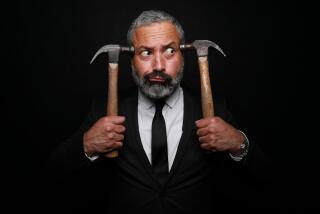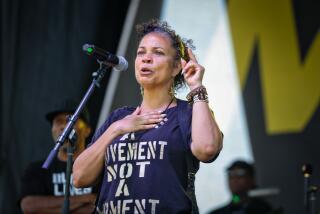Old West Meets Middle East After Sept. 11
- Share via
SAN DIEGO — A poster for the movie “Tombstone” hangs prominently in Randall B. “Randy” Hamud’s home law office. It depicts a group of gunslinging cowboys with the warning: “Justice Is Coming.”
Hamud, an Arab American attorney who often wears a cowboy hat and boots himself, said the poster serves as a daily reminder of his quest for justice for Muslim immigrants arrested since last September’s terrorist attacks.
Hamud has represented four San Diego residents held as material witnesses because they knew Nawaf Alhazmi and Khalid Almihdhar, who lived in San Diego in 2000 and were among the hijackers who crashed a jet into the Pentagon. Hamud has also represented more than 20 other Middle Eastern immigrants questioned or detained by the federal government, as well as the mother of Zacarias Moussaoui, the man facing trial as the suspected “20th hijacker.”
In taking their cases and speaking out on their behalf, Hamud has gone from legal obscurity as a personal injury lawyer to national exposure as a leading Arab American attorney. He has appeared on almost every major network news and talk program.
“I’ve been an expressive voice for Arabs and Muslims,” agreed Hamud, 56. “But it’s the Constitution I’m advocating; constitutional rights and loyalty to those rights. In times of emergency, they should not be trampled on.”
Hamud is the first to admit that he is an unlikely person to have become a spokesman for the Arab American and Muslim community, because he has always considered himself a secular American.
Born in Montebello to Lebanese American parents, Hamud is Muslim. But before Sept. 11, Islam and Arab culture were as foreign to him as they are to many other Americans. Indeed, he said, some Muslims would label him an infidel.
Hamud speaks Spanish but not Arabic. More important, he does not pray, go to mosque or fast during Ramadan.
“This was all new to me, but I’m getting used to dealing with it,” he said. “This is just one of the ways that my world changed after 9/11. I’ve had to read the Koran to understand my clients.”
Most of Hamud’s previous legal experience was as a deputy city attorney in Compton and Los Angeles and as a corporate lawyer for Arco.
He got his first case related to Sept. 11 five days after the attacks, when he was asked by a friend on the board of the Islamic Center of San Diego to represent a Kuwaiti immigrant who he says had unwittingly helped Alhazmi with a $5,000 wire transfer.
As the attorney and his client, who was never arrested, were meeting with the FBI, Hamud’s cell phone rang. It was another acquaintance asking him to represent Osama Awadallah, whom the FBI had detained as a material witness.
Later that day, Hamud went to the downtown Metropolitan Correctional Center, identified himself as Awadallah’s attorney and asked to see him. The guards brought out a small Middle Eastern man who talked with Hamud for almost an hour before the lawyer referred to him as “Osama.”
“Osama? Who’s Osama?” the detainee asked.
The guard had brought out Mohdar Abdullah, another material witness who also needed an attorney. Hamud thus got a twofer with a single visit.
Two of the San Diego material witnesses represented by Hamud were eventually freed; the other two were convicted of immigration law violations and falsifying Social Security cards. When they were arrested, U.S. law enforcement sources told reporters that the four had ties to terrorists--but none was ever charged with crimes relating to terrorism.
In taking more than two dozen cases, most of them for free, Hamud has gotten religion of a sort--about what he sees as the trampling of human rights. “This fight isn’t about Arabs,” he said. “It’s about the Constitution.”
Hamud said government leaks have been unfair, painting his clients as enemies of the state when they were nothing more than “casual acquaintances” of the terrorists.
And Hamud said he believes that measures taken by Atty. Gen. John Ashcroft, including the extended detention of people held as material witnesses, violates basic tenets of American justice.
“This is what happens when people condone racial and religious profiling,” he said.
Bill Gore, special agent in charge of the FBI’s office in San Diego, said he considers Hamud a friend and laments government leaks.
“I agree with Randy. It’s not fair to have irresponsible statements made that can’t be backed up in court. If I find out who’s responsible, I’ll fire the person,” Gore said.
Hamud has proved to be an aggressive counsel. Some FBI officials have privately labeled him a media hound. He did not help his reputation by calling the attorney general “Adolf Ashcroft” in one interview.
He also did not endear himself to some law enforcement officials last fall, when he passed out 3-by-5 cards with constitutional rights printed in English and Arabic. The cards advised Muslims that they have a right to remain silent and to have a lawyer present during questioning.
“Agents were going around to people’s homes, standing on the porch and pressing them to answer questions. They were pressing people to take polygraphs, never advising them the tests were optional,” Hamud said.
Gore acknowledged that agents were “showing up on people’s porches at all hours,” but denied that they had pressured anybody to take a polygraph.
Knocking on doors “was the appropriate thing to do to determine if there was a support structure in San Diego and to prevent another act of terrorism,” he said.
Hamud said some of his clients have cooperated eagerly with the FBI and offered crucial information about Alhazmi and Almihdhar, a point with which Gore agreed. “Randy is absolutely correct about the community’s help. It hasn’t been widely reported in the press, but in the 25 or so speeches I’ve given in the past year, I’ve praised the Middle Eastern community for their assistance. I truly believe we couldn’t have been as successful without their assistance,” Gore said.
Hamud’s patriotism has been questioned on the street and on talk shows. But he has more in common with his critics then they realize. He idolizes his uncle Hassan, an Army Ranger who was awarded a Silver Star and Purple Heart in the Korean War.
His heroes include Gen. George S. Patton and National Rifle Assn. President Charlton Heston. Hamud, an NRA member, called Heston a “class act” who “breathed credibility back into the NRA.”
Before 9/11, Hamud said, he had grown bored with his civil practice, which included immigration and dog bite cases.
“I was thinking of switching careers, going into teaching,” he said. “But since Sept. 11, I’ve earned a new appreciation for what I am as an attorney and for the Constitution I’m sworn to uphold.”
Hamud said he remains exasperated by clients who stop meetings to pray. Conversations punctuated with “Allah this or Allah that” took some getting used to, he said.
But he has also gained a new understanding about his culture and religion.
“I knew the bare bones about Islam and my Arab background,” he said. “[Now] I’m talking to my mother more about both, and I’m trying to read through the Koran.”
More to Read
Sign up for Essential California
The most important California stories and recommendations in your inbox every morning.
You may occasionally receive promotional content from the Los Angeles Times.













